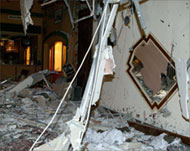Two more embassies close in Jordan
Two more Western embassies in Jordan have closed for security reasons, a day after Britain took a similar move.

The Canadian and Australian embassies announced their premises in the Jordanian capital, Amman, would remain closed from Sunday until further notice.
The move comes two months after bomb attacks claimed by al-Qaida against three luxury hotels in Amman that killed 60 people plus three bombers and wounded about 100 more.
Australia warned travellers in a statement of the threat of new attacks on Western targets in the kingdom, a key US ally regarded as one of the most stable countries in the volatile Middle East region.
“Reports suggest terrorists may be in the final stages of planning attacks against Westerners and places frequented by Westerners in Jordan,” the embassy said.
“The Australian embassy in Jordan will be closed until further notice due to the security situation.”
An official from the Canadian embassy in Jordan said its embassy would remain closed until further notice.
 |
|
Al-Zarqawi’s organisation claimed |
A Canadian foreign ministry travel advisory, dated Saturday, said the Jordanian government maintained “security measures that make it difficult for extremist groups to operate”. However it added that travellers “should exercise caution”.
The British embassy in Jordan announced on Saturday it would remain closed “until further notice” and warned of the threat of new attacks on Western targets in the kingdom.
Specific intelligence
Nasser Jawdeh, a Jordanian government spokesman, said on Saturday there was no reason to close the embassy, based on investigations into the specific intelligence held by the British.
He added, however, that security had been beefed up around the mission and in the neighbourhood.
The 9 November attacks were claimed by the Iraq-based al-Qaida group of Jordanian-born Abu Musab al-Zarqawi, who has threatened new attacks on his homeland.
In August, a Jordanian soldier was killed in a rocket attack in the southern port city of Aqaba, also blamed on al-Zarqawi’s group.
Al-Zarqawi already faces a death sentence in Jordan over the 2002 murder of a US diplomat and is the most wanted man in Iraq, where there is a $25 million bounty for his death or capture.
Al-Zarqawi, once described as a “thug” by King Abdullah II, was released from jail in 1999 as part of a royal pardon when he took office after the death of his father King Hussein.
Al-Zarqawi believes that governments in Arab and Islamic countries must apply the Sharia law, and describes those which do not as “infidel” governments.